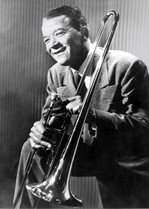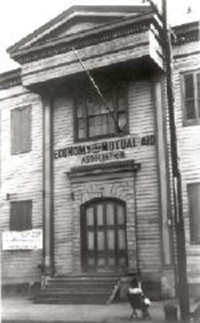
Convergence of Ragtime and the Blues 3
Edward "Kid" Ory , the son of a White Frenchman and a Creole woman of Afro-Spanish and Native American heritage, was born in La Place, Louisiana, and classified as a Creole of color. In 1901, at the age of fourteen, he already led a band of his own, organized dances for his neighbors, and cast an ambitious eye toward New Orleans, the Mecca of jazz. In 1907 Ory took his Woodland Band to the city. Over the next decade, he upgraded his personnel to include such future jazz stars as Joe Oliver, Louis Armstrong, Johnny and Warren Dodds, and Jimmie Noone. Ory was also a talented promoter. He revolutionized the practice of "cutting contests" between bands that advertised on horse-drawn furniture wagons when he introduced the use of motorized trucks-no band could escape him! For several years his band held forth at Pete Lala's saloon in Storyville. In 1921, he was the first Black New Orleans jazz bandleader to record "Ory's Creole Trombone."

Edward "Kid" Ory

Economy Hall
His greatest triumphs were probably at Economy Hall-a dance hall in the Treme section bordering on Storyville and the French Quarter. As the headquarters of the "Economy and Mutual Aid Association," the Economy was typical of numerous social aid and pleasure clubs and benevolent associations. These organizations provided various social services, including brass band funerals and dances, to the New Orleans Black community. Outside entrepreneurs like Ory, who maximized attendance at his dances, could also rent the Economy by renting nearby Hope's Hall and keeping it closed. Ory's career as a bandleader in the Crescent City (1908-1919) coincided with when the "collective improvisation" approach of New Orleans musicians reached maturity. As a result, his band became an incubator to develop Black jazz talent, much like Jack Laine's bands.

Jazz is quintessential American music growing out of all different cultures.
(Ken Burns, 2001)

Heebie Jeebies
Say, I've got the Heebies
I mean the Jeebies
Talking about
The dance, the Heebie Jeebies
Do, because they're boys
Because it pleases me to be joy
Louis Armstrong
Very few of the men whose names have become great in the early pioneering of jazz and of swing were trained in music at all. They were born musicians: they felt their music and played by ear and memory. That was the way it was with the great Dixieland Five.





